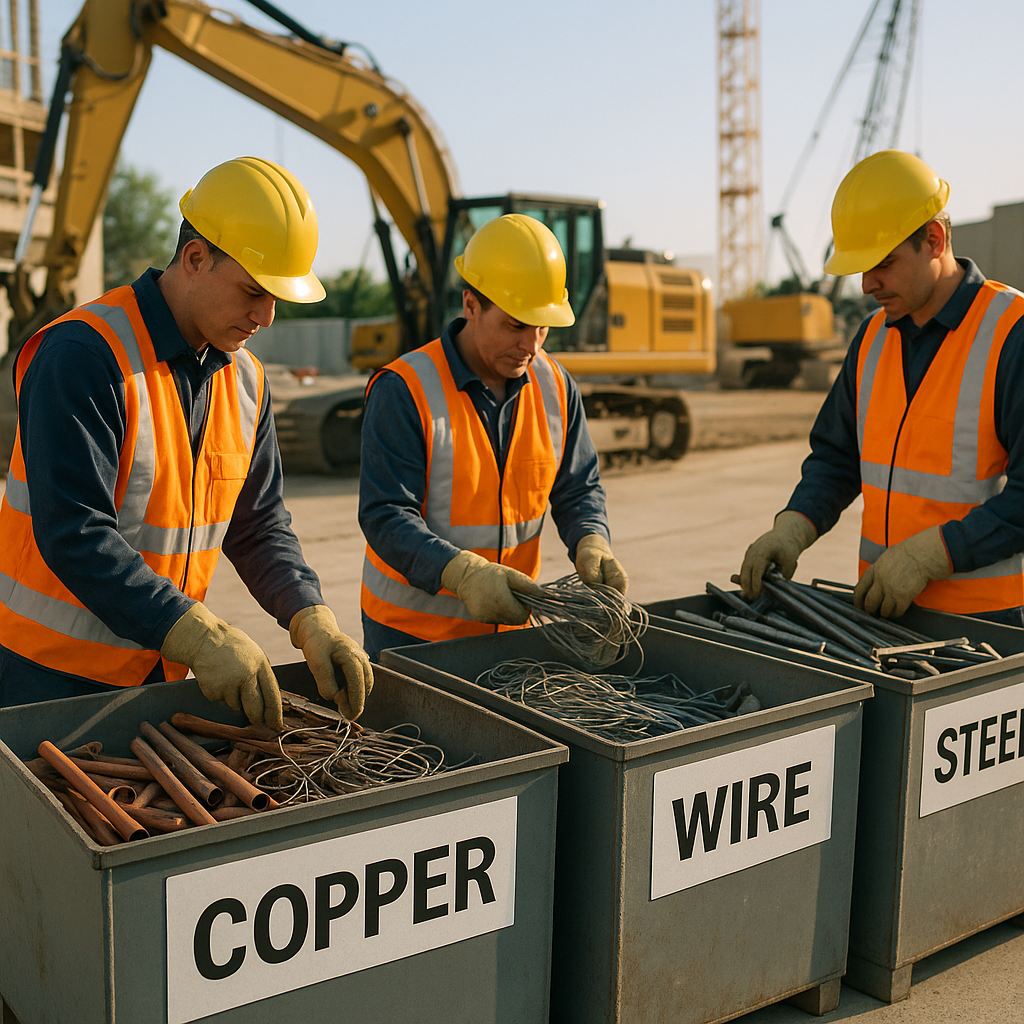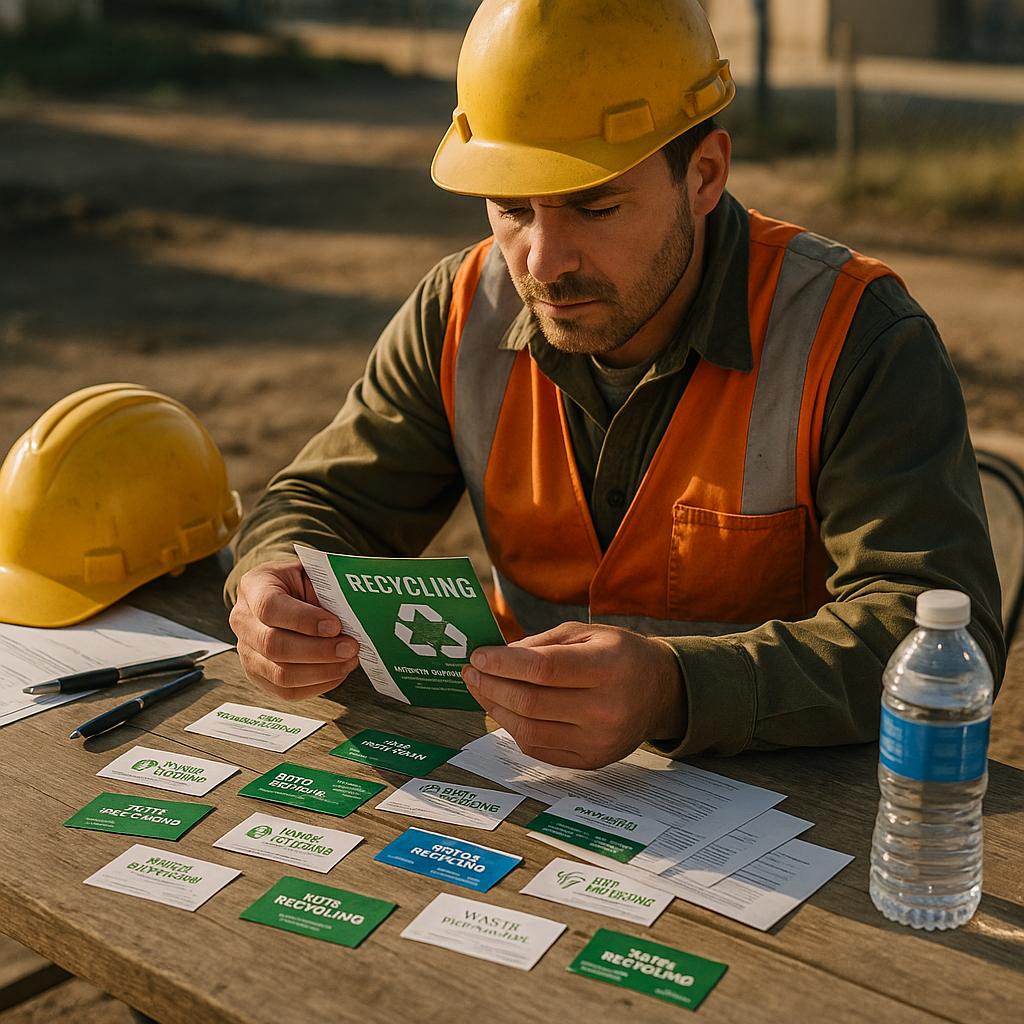5901 Botham Jean Blvd, Dallas, TX 75215
What to Do With Scrap Metal From Job Site
July 17, 2025Scrap metal from job sites includes a wide variety of recyclable materials that accumulate during construction, renovation, and demolition projects. Steel beams, iron pipes, aluminum siding, copper wiring, and brass fixtures are commonly found on construction sites.
These valuable materials typically come from structural components, plumbing systems, electrical installations, and HVAC units. On busy construction sites, metal waste piles up quickly as workers trim excess materials, replace outdated components, or dismantle structures. Builders generate tons of metal waste annually, with steel being the most abundant recyclable material.
Without proper management, accumulated scrap metal creates significant challenges. It clutters work areas, poses tripping hazards, and can reduce overall productivity. Sharp edges on discarded metal pieces present safety risks, while improperly stored metals may degrade due to weather exposure. Recognizing scrap metal as a resource rather than waste is the first step toward responsible management and recycling.
How Can Scrap Metal Pick-Up Services Benefit Job Sites?

Construction and renovation sites generate substantial amounts of scrap metal that can impede operations. Professional scrap metal pick-up services offer a convenient solution, adding value to job sites beyond simple waste removal.
Time and Cost Savings
Scrap metal pick-up services eliminate the need for job site personnel to transport heavy metals themselves. This saves valuable time that workers can dedicate to their primary tasks instead of waste management.
Many pick-up services provide on-site receptacles, making disposal straightforward and organized. These containers enable efficient sorting of different metal types, maximizing potential returns when the scrap is sold.
By utilizing pick-up services, construction companies can also reduce disposal costs. Instead of paying fees to discard metal at landfills, businesses can often sell their scrap for cash, turning waste into a revenue stream.
Enhanced Job Site Safety
Accumulating scrap metal creates significant workplace hazards. Sharp edges pose cutting risks, while heavy metal pieces can cause injuries if improperly handled or stored.
Regular pick-up services ensure that potentially dangerous materials don’t pile up in walkways or work areas. This reduces accident risks and creates a safer environment for all personnel on site.
Clear pathways also allow for easier movement of equipment and materials throughout the job site, enhancing overall site navigation and reducing the risk of trips and falls.
Increased Productivity
Ensuring projects finish within designated timeframes and financial constraints is a crucial aspect of job site productivity. Scrap metal removal plays a direct role in this.
Clearing workspace gives workers room to perform their jobs effectively and efficiently. Without piles of scrap metal taking up valuable space, teams can move freely and complete tasks without obstruction.
The psychological impact of an organized site shouldn’t be underestimated. A clean workspace fosters a culture of excellence and boosts morale within the company, leading to better overall performance.
Environmental Sustainability
Recycling scrap metal from job sites provides significant environmental benefits. It reduces landfill waste by repurposing metals that would otherwise take up space and potentially leach harmful substances into soil and groundwater.
The process conserves natural resources by reducing the need for new mining operations. Recycling metals requires significantly less energy compared to extracting and processing virgin materials.
For construction companies pursuing green certifications or seeking to enhance their sustainability profile, partnering with scrap metal recyclers demonstrates environmental responsibility to clients and stakeholders.
Choosing the Right Scrap Metal Pick-Up Service
When selecting a provider, look for companies that offer transparent pricing without hidden fees or complicated contracts. The best services provide flexible scheduling that works around your construction timeline.
Experienced companies bring the expertise needed to identify and properly handle different metal types. This ensures you receive fair market value for your materials and comply with relevant disposal regulations.
Many services offer both scheduled regular pickups and on-demand collection, allowing job sites to maintain optimal organization regardless of project phase or metal accumulation rates.
What Are the Best Practices for Managing Scrap Metal on Job Sites?

Effective scrap metal management is crucial for keeping a construction site safe, organized, and profitable. When handled correctly, scrap metal becomes a valuable resource rather than a waste management challenge. The following best practices will help you maximize your scrap’s value while ensuring workplace safety.
Implement Proper Sorting Systems
Sorting scrap metal is the foundation of efficient recycling. Training your crew to identify and separate different types of metals is essential for maximizing your returns.
Sort ferrous metals (containing iron) from non-ferrous metals (such as copper, aluminum, and brass). A simple magnet test is effective—if the magnet sticks, it’s ferrous. Non-ferrous metals typically have higher value per pound, so keeping them separate increases your recycling revenue.
For larger operations, consider creating designated sorting stations with clear signage indicating where each type of metal belongs. This helps maintain consistency across shifts and crew changes.
Choose Appropriate Collection Containers
Using the right containers for scrap metal collection significantly enhances efficiency and safety.
For small-scale operations, heavy-duty bins of varying sizes are effective for different types of metals. Larger projects benefit from specialized dumpsters with reinforced bottoms to handle heavy loads. Ensure all containers are clearly labeled to prevent cross-contamination of metal types.
Position containers strategically throughout the job site to minimize the distance workers need to carry scrap. This reduces the risk of injuries and improves overall collection efficiency.
Schedule Regular Removal
Accumulated scrap can create hazards and slow down operations. Establish a regular pickup schedule with your recycling partner to keep your site clean and safe.
For high-volume projects, arrange frequent pickups to prevent overflow. Some recycling companies offer on-call service for sudden increases in scrap volume. Develop relationships with reliable recycling partners who understand construction timelines and can accommodate your schedule.
Keep track of your scrap removal with a simple log to identify patterns and adjust your pickup frequency as necessary throughout the project lifecycle.
Prioritize Safety in Handling
Scrap metal presents numerous safety hazards if not handled properly. Implementing strict safety protocols protects your workers and reduces accidents.
Require appropriate personal protective equipment (PPE), including heavy-duty gloves, safety glasses, and steel-toed boots when handling scrap metal. Train workers to be cautious of sharp edges, especially when handling sheet metal remnants.
Establish weight limits for manual lifting and provide mechanical assistance for heavier pieces. Ensure that equipment used to move scrap, such as forklifts or cranes, is operated by properly trained personnel.
Maximize Value Through Preparation
Taking a few extra steps to prepare your scrap can significantly increase its value.
Remove non-metal attachments like plastic, rubber, or wood when possible. Clean excessively dirty metal when practical—cleaner scrap typically commands better prices. For copper wire, stripping the insulation (when economically feasible) can substantially increase its value.
Stay informed about current scrap prices to time larger shipments when market conditions are favorable. Many recyclers offer price lists online or through mobile apps.
Implement Tracking and Documentation
Maintaining records of your scrap metal management provides valuable data for future projects and ensures regulatory compliance.
Document the types and quantities of scrap generated and recycled. This information helps estimate future projects and identify opportunities to reduce waste. Maintain receipts from your recycling partner for accounting purposes and potential tax benefits.
For projects requiring environmental certification, good documentation of recycling efforts can contribute to achieving sustainability goals.
Train Your Team
A well-trained workforce is essential for an effective scrap management system. Regular training ensures that everyone understands their role in the process.
Educate all site personnel on the importance of proper scrap sorting and handling procedures. Designate specific team members as recycling coordinators who can answer questions and enforce protocols.
Consider offering incentives for teams that consistently follow proper scrap management practices. Recognition programs can boost compliance and create a culture of sustainability on the job site.
How to Choose the Right Scrap Metal Recycling Service?

Choosing a reliable scrap metal recycling service involves careful consideration of several key factors. The right provider can greatly impact both environmental benefits and your financial return. This decision is critical as effective metal recycling significantly contributes to resource conservation.
Verify Certifications and Compliance Records
Environmental compliance is a crucial aspect to consider in a metal recycling business. A legitimate operation should readily offer proof of all required permits and licenses, ensuring they adhere to waste management protocols and environmental regulations.
Inquire about potential recycling partners’ compliance history and environmental initiatives. Reputable companies often have relationships with environmental agencies and industry associations, reflecting their commitment to sustainability.
Seek recyclers with specialized certifications like ISO 14001 for environmental management systems. These credentials indicate a systematic approach to minimizing environmental impact during recycling.
Evaluate Pricing Transparency and Payment Methods
Pricing transparency is a top concern when selecting a scrap metal recycler. The best companies provide clear, upfront information about how they determine metal values, including their grading system and how various factors affect compensation rates.
Request details about their payment methods and timing. Some services offer immediate payment, while others may require a brief processing period. Be cautious of companies unwilling to provide written quotes or using questionable weighing practices.
A reputable recycler should provide documentation of current market rates. Many quality providers now publish their pricing online or via mobile apps, facilitating offer comparisons before transportation.
Assess Operational Capabilities and Equipment
The operational capacity of a recycling service directly affects its ability to handle your materials efficiently. Visit facilities to observe their equipment and processing methods firsthand. Professional operations maintain clean, organized yards with appropriate sorting areas.
Ensure they have specialized equipment for handling various metal types. Quality recyclers invest in technology such as precision scales, material handlers, and processing machinery that maximize recovery values.
For businesses with regular recycling needs, inquire about container services, scheduled pickups, and volume-based pricing structures. The best recyclers offer customized solutions based on specific requirements.
Research Reputation and Service History
Customer reviews offer valuable insights into a recycler’s reliability and service quality. Search online platforms for feedback from previous customers, focusing on comments about fair treatment, accurate weighing, and professional interactions.
Look for companies with a long history in the recycling industry. Longevity often signifies stability and reliable business practices. Many reputable recyclers share their company history and industry experience openly.
Contact local business associations or chambers of commerce to inquire about the recycler’s community standing. A company’s reputation among other businesses can indicate their operational integrity.
Compare Additional Services and Convenience Factors
The best recycling partners offer more than basic material acceptance. Some providers offer demolition support, industrial cleanup, or specialized processing for unique materials, significantly enhancing partnership value.
Consider logistical convenience when making your choice. Factors like location accessibility, operating hours, and wait times impact your overall recycling experience. The best facilities maintain efficient intake processes that respect your time.
For industrial clients, seek recyclers that deliver comprehensive environmental compliance documentation. This service is particularly beneficial for businesses with sustainability initiatives or regulatory reporting requirements.
Conduct a Trial Transaction
Before committing to a long-term relationship, conduct a small trial transaction with your prospective recycling partner. This allows you to experience their processes firsthand and assess their professionalism, efficiency, and transparency.
During this trial, observe their material inspection and sorting thoroughness, communication quality, and whether final compensation matches initial estimates. Note their safety protocols and staff interactions.
After completing the transaction, evaluate whether the experience met your expectations and if the recycler delivered on their promises. This practical assessment often provides insights beyond marketing claims or online reviews.
Conclusion: Maximizing Value from Job Site Scrap Metal

Properly managing scrap metal from job sites offers numerous benefits beyond simple waste disposal. Through effective sorting practices, construction companies can transform what was once worthless debris into valuable resources. This approach not only creates potential revenue streams but also significantly improves site safety by reducing hazards from accumulated metal waste.
The shift from construction waste to recycled material is a positive outcome for both businesses and the environment. By implementing strategic waste management plans, separating metals at the source, and partnering with reliable recycling services, construction companies contribute to resource conservation while potentially reducing project costs. These practices lower the demand for raw material mining, decrease energy consumption, and minimize the environmental impact of construction activities.
Contact Okon Recycling at 214-717-4083 for comprehensive solutions to efficiently handle your construction site scrap metal needs and maximize your recycling value.
